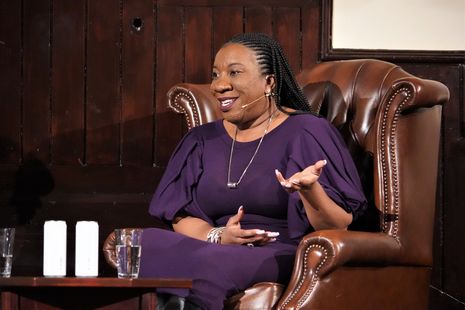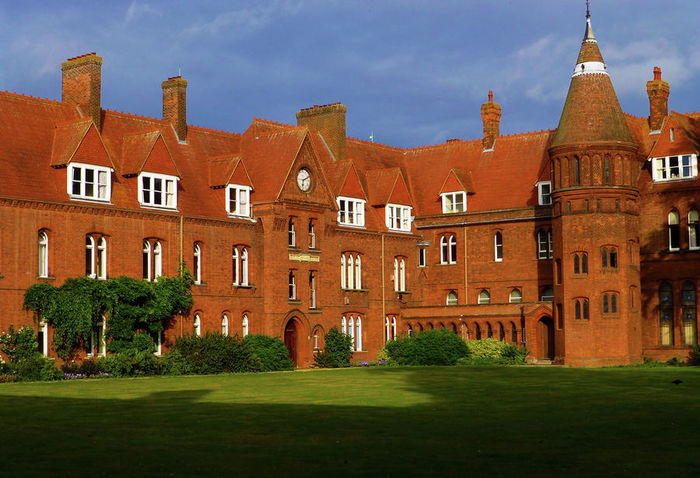Me Too’s Tarana Burke: ‘This movement is built on the back of everyday survivors’
Interviews Editor Georgina Buckle talks to activist Tarana Burke about reclaiming space with the words ‘me too’

Entering the room to meet Tarana Burke, I am immediately made aware of her poised and commanding presence. Radiating a sense of self-assurance whilst surrounded by an entourage of men, Burke cuts a powerful figure. This impression is made deeper when hearing Burke’s sharp and eloquent speech, both through our interview and later in her Cambridge Union talk.
It should come as no surprise that a woman who has founded a global talking point regarding sexual assault will be surrounded by a team, duly accompanying her on talks across the world. As Burke mentions in her Union talk, she was speaking in a college in Canada a few weeks past. The ‘me too’ movement has had a long timeline since Burke’s coinage of the phrase on Myspace in 2006, where she initially used the phrase on the social networking app to encourage survivor empowerment. Despite the term ‘me too’ first being used by Burke in 2006, it is still very much propagated in the media. The demand for Burke to give talks across the world demonstrates a rightly continued interest in a phrase that has become somewhat of a ‘buzzword’ with its frequent media attention and use.
Burke’s founding of the phrase is often less reported. The typical association of the ‘me too’ movement was its launch into mainstream media in 2017, when #MeToo went viral after a group of Hollywood women stepped forward with sexual assault allegations against the then-famed director Harvey Weinstein. But what Burke wants to assert is that the crux of the movement’s viral peak was the public. ‘What made the hashtag go viral was everyday people who got the courage to come forward and say me too’, Burke stresses. ‘There’s a way that we erase the fact that this movement is built on the back of everyday survivors. Those survivors were you and me, our cousins, our mothers.’
With all the people that came forward to tell their stories in mind, Burke is wholehearted in saying she wasn’t surprised that the phrase ‘me too’ became viral. ‘I knew what the breadth and depth of the effect of sexual violence was around the world and the hashtag allowed people to get this information. If it was ever to take off, this would be the result because there’s too many of us.’
"Creating a space where people could talk about what it means to be a survivor"
Whilst the ‘me too’ movement is still living off this viral energy from 2017, there’s a feeling that this mainstream media attention has diverted away from the roots of the phrase. Certainly, I entered the conversation with one idea of ‘me too’, and left enlightened by Burke’s deconstruction of the term. Thinking back to 2006, her purpose for the phrase was to ‘create space’. ‘It’s declarative, right?’ Burke intently explains. ‘Once you say it you give permission for other people to say it. And there were no spaces where people could even say it. Creating that kind of space where people could talk about, think about, explore what it means to be a survivor.’
During Burke’s Union talk, she opens up more about the origins of the phrase. Having experienced sexual assault both as a child and a teenager Burke was left isolated to any form of help to become ‘whole’ again. Her low-income, working-class roots are also crucial to address, with the financial disparity between survivors leading to vast inequalities in the support available to them. What Burke seriously highlights in addition to this is that of the limited support available to black, Asian and minority ethnic individuals in comparison to their white counterparts. A fundamental principle of Burke’s activism is placing women of colour as the centre focus for her work, arguing that prioritising support of these marginalised groups is necessary. Thinking back to her younger self’s thought process, Burke becomes impassionate: ‘it felt unfair that I couldn't have [happiness] and other people could. Was it because I'm poor? Because I can't afford therapy? Why can't I have what other people have?’.
It is this isolation – survivors left alone with no guidance toward healing – that the very phrase ‘me too’ seeks to counteract. Burke recalls a story regarding the phrase’s foundation: a girl came to her within a youth group and shared her own story of sexual assault, which drew many similarities to Burke’s experience. Although she had encouraged survivors to share their experiences and trust her, when it finally happened Burke recalls feeling as if she had been ‘hit by a tonne of bricks’. At that moment, Burke offered as much verbal support as she could, except the sharing of her own story. This poignant moment weighs heavily on Burke’s conscience, after realising that perhaps the only thing she should have said to make a difference was simply: ‘it happened to me too’.
"What is lost amidst this noise is the fact that the phrase is there to reclaim space"
This was a moment of realisation for me. The noise of the mainstream media has propelled the phrase into the limelight and has inevitably warped it into something ‘clickable’, its purpose and effect sometimes unclear. This has garnered attention since 2017. From backlashes branding the movement as ‘totalitarian’ and its sparking unsubstantiated accusations against men, to the association of it being part of the women’s movement, Burke denies them all. What is lost amidst this noise is the fact that the phrase is there to reclaim space, partly through the knowledge you are not alone. It is for survivors to say that ‘we might have had different experiences happen, but the feelings of trauma we can recognise in each other.’ More than that, it doesn’t just have to be spoken to another person. Burke is aware that she is vocal about her ‘me too’ for all the people who cannot speak or choose not to. There is immeasurable power within these words just by acknowledging them. ‘You can say it in your pillow, think it, whisper it to yourself’, Burke says movingly. ‘It's about getting it out of your body and not just about telling the whole world, and that's solidarity too.’
"It's not just about telling the whole world, and that's solidarity too"
Burke frequently refers to how we all need ‘spaces’ to enter into a safe dialogue concerning sexual assault and abuse. Where there is room, it is vital that these conversations are happening in order to dismantle a pervasive rape culture. Pressed about her response to individuals stuck in their criticisms against the movement, Burke laughs, ‘it’s lazy.’ ‘If you have the space to hear, then we can have a conversation… For the people who may come in with that idea and then hear something and think ‘that’s not what I thought’ – that’s somebody that I want to continue to have a conversation with.’ Burke is adamant in saying that it’s not just men who need these conversations: ‘Women are sexist, women propagate misogyny, so we all have to share [responsibility]’. It is these dialogues which carry the power to build community and bring people onto the side of the movement: for allies and advocates to bring an end to sexual violence.
With continued open dialogues and acknowledgement of the harm caused by sexual assault, there is hope for survivors and allies to reclaim more of their space in the world. This acknowledgement, both within ourselves and with others, can begin with Burke’s phrase. As she aptly says, ‘me too can be the conversational starter, or it can be the whole conversation.’
 Comment / Plastic pubs: the problem with Cambridge alehouses 5 January 2026
Comment / Plastic pubs: the problem with Cambridge alehouses 5 January 2026 News / Cambridge academics stand out in King’s 2026 Honours List2 January 2026
News / Cambridge academics stand out in King’s 2026 Honours List2 January 2026 News / Cambridge businesses concerned infrastructure delays will hurt growth5 January 2026
News / Cambridge businesses concerned infrastructure delays will hurt growth5 January 2026 News / AstraZeneca sues for £32 million over faulty construction at Cambridge Campus31 December 2025
News / AstraZeneca sues for £32 million over faulty construction at Cambridge Campus31 December 2025 Interviews / You don’t need to peak at Cambridge, says Robin Harding31 December 2025
Interviews / You don’t need to peak at Cambridge, says Robin Harding31 December 2025










